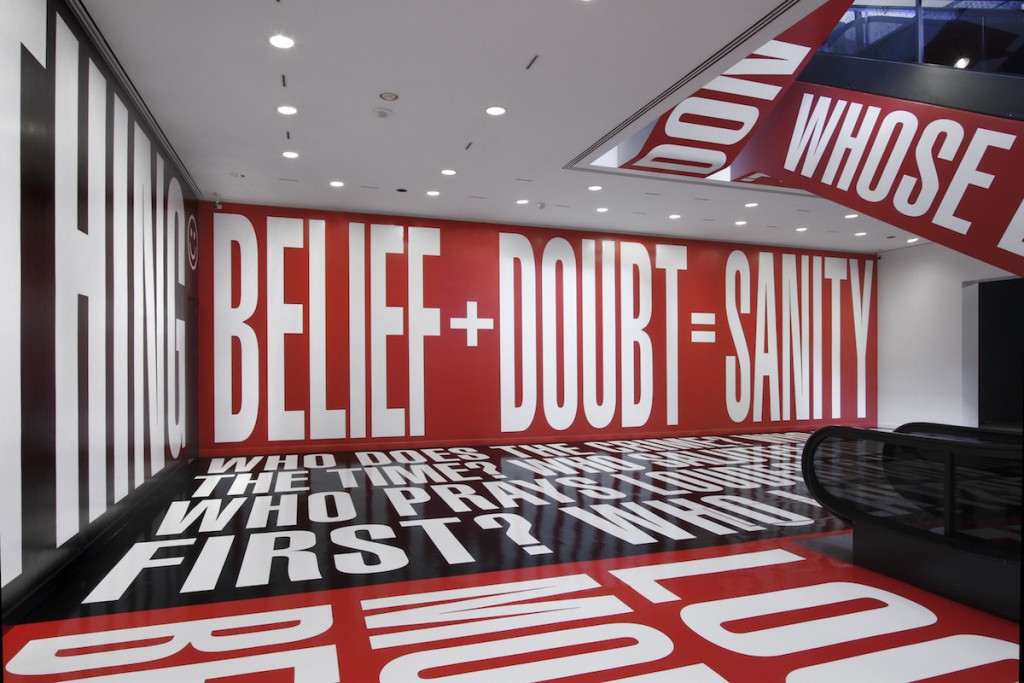
Barbara Kruger, Belief+Doubt, installed at the Hirshhorn Museum and Sculpture Garden, 2012. © Barbara Kruger. Photo: Cathy Carver
“I believe in doubt,” says Barbara Kruger, who recently worked with Los Angeles–area high schoolers in the Getty Artists Program to create her Whose Values? project. In an interview with Grover Cleveland Charter High students, she discusses money, power, museums, and technology. “As long as you ask questions, you can have an understanding of how the world works, of how power works.”
- One 113 years old, the other 102, art magazines ARTnews and Art in America are merging. Both will continue publishing print versions, but under the ownership of Brant Publications, digital operations will consolidate at artnews.com. Assessing the merger, artnet News critic Ben Davis gives a grim prognosis: “You can read it as another chapter in the sad decline of print. But scrutinizing the tea leaves, you can also see it as another augury that the discourse of art is more and more subordinate to fashion-obsessed celebrity and short-term finance.”
- Migrant workers building western museum branches on Abu Dhabi’s Saadiyat Island continue to “face crushing debt, substandard wages and harsh working conditions,” according to a new report published last week by Gulf Labor. The work coincides with the group’s inclusion (with G.U.L.F.) in the Venice Biennale, a platform it used to launch a new book, convene a panel on harsh labor conditions in the United Arab Emirates, and occupy part of the Israeli Pavilion.
- Ai Weiwei is headed to London after all. After receiving his passport back from Chinese authorities after four years, the Beijing-based artist applied for a six-month visa to travel to London to install a solo show at the Royal Academy of Art. British officials denied him the visa, instead granting a 20-day stay, citing that he’d lied on his application about his “criminal” past (while he was famously jailed, he was charged with no crime). In a reversal, he got what he wanted last week: a six-month visa and an apology from Britain’s Home Secretary, who regrets the error. His Royal Academy show, focused on work since 1993, opens September 19.
- A key Fluxus artist, Shigeko Kubota has died at age 77. After making an impact with her performative 1965 work Vagina Painting, she quickly turned to sculpture, incorporating video technology into her work—as did her late husband, Nam June Paik. She frequently referenced Buddhist themes in her video-based works. “I grew up in a Buddhist temple, and so I like Buddhist sculpture,” she said in a 2014 interview for MoMA’s post. “It stimulates the imagination. I saw paintings of hell and paradise unfolding on the walls like a film script. I think that’s video. A mural. If a Buddhist mural moves here and there, then that’s video.”
- In the age of streaming music, it’s harder than ever to make a living, writes David Byrne. In a New York Times op-ed, he calls for greater transparency around fees for streaming music, noting the industry’s out-dated rate of pay to artists (typically 15 percent): “This might make sense if streaming music included manufacturing, breakage and other physical costs for the label to recoup, but it does not. When compared with vinyl and CD production, streaming gives the labels incredibly high margins, but the labels act as though nothing has changed.”
- Artist pay is a topic performance artists Gerard & Kelly have been wrestling with as well. In drawing up terms for the sale of their work Timelining to the Guggenheim, the duo included performers’ pay along with other factors, like how the work would be taught to future generations. The resulting 75 pages of paperwork included a rate of pay agreeable to (and ultimately exceeded by) the Guggenheim: NYC’s living wage times eight hours (or $105.04 per appearance). “No one can show this work without following these standards,” says Kelly. Timelining will be performed at the Guggenheim every Monday evening through September 7.
Follow Art News From Elsewhere on the Walker Art Center homepage or via @walkermag, the Walker’s editorial Twitter feed.



